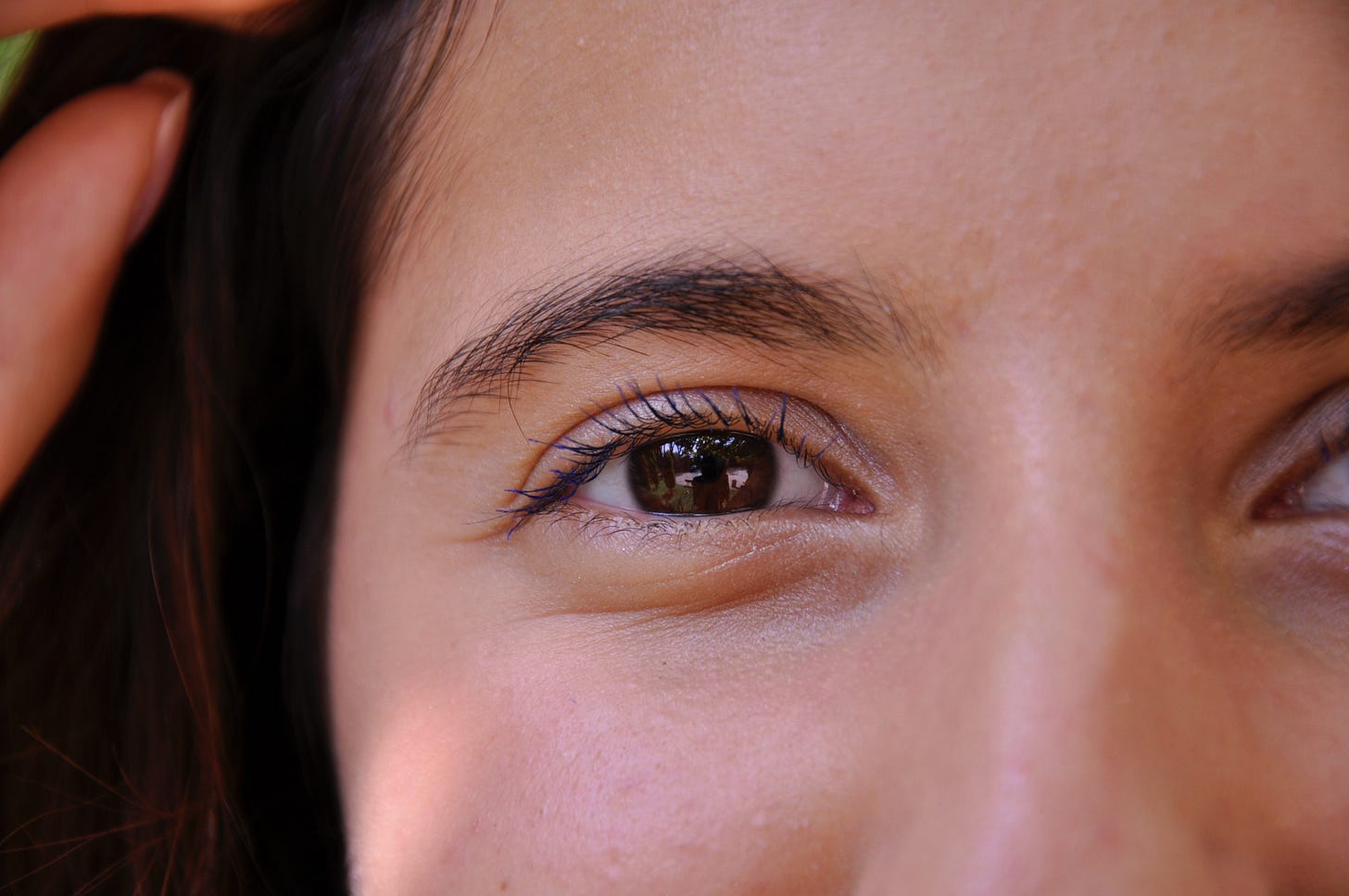The World's Real Queer
Seeing "again for the first time"
It’s cold and rainy here. Autumnal cold, enough for my husband to have started wearing sweaters in the house this week, while a one day’s train ride south from us is sweltering heat.
Wild, all this: climate change and heat domes, trapping unseasonable cold and wet here while southern Europe suffers.
Wild, all this. My lettuces are happy; my peppers, not so much. The herd of dairy cows behind my house will be happy; the pastures around here turned brown unseasonably early, but they’re getting their green back already.
Wild, all this. So strange what’s happened, what’s been done. It’s a thing of terror for global distribution systems, and civil society, and an opportunity for more terror in the minds of government planners and disaster capitalists.
But for me, it’s mostly now just a thing of wonder.
The world’s gotten strange in the way a lover or a friend has gotten strange, strange enough that what we took for granted can no longer just be considered granted us. The world’s acting oddly, unheimlich, strange, weird, bizarre, and most of all, queer.
I miss that word, queer. I miss what it used to mean, before being queer was something you told people you were. That’s not how queer worked, not what it meant.
There’s nothing queer about any of the people who’ll tell you they’re queer. That ain’t queer, that’s normal. Queer’s got nothing to do with the kind of sex you have, what you dress up like, or what pronouns you use.
We all have pronouns. We all have sex. We all dress funny. We all think we’re different. None of that’s queer, that’s just fucking normal.
Queer is uggianaqtuq, the Inuktitut word meaning “a friend acting strangely or behaving unusually.” Growing up, my mamaw would say, “that dog’s real queer,” meaning it wasn’t acting like it usually did. Not that it was different from other dogs, but different from itself.
The weather here is real queer, and so is the land. The whole world and everything in it is real queer right now. Something’s up with it. It’s acting strangely, behaving unusually, and that ain’t gonna change.
In fact, all we’ll ever really be able to be certain about it is that it’s uggianaqtuq, queer, strange, unheimlich. Maybe especially unheimlich, “unhomely,” because it’s always going to be our home, even if we don’t recognize it, and the heimlich contains the unheimlich. From
’s The White Deer:In Freud’s classic 1919 treatise on the uncanny (unheimlich in German), he first discusses the contemporary definition of heimlich (native, familiar, and domestic), and then refers to Daniel Sanders’ 1860 dictionary of the Ger- man language, which provides some of the older definitions of heimlich that had become obsolete. Previously, in addition to the connotations of the family and the home, heimlich also referred to domestic or tamed ani- mals. Bearing the latter definition in mind, it is clear that the sudden and unexpected appearance of a deer is much more unheimlich than the sudden appearance of, for instance, an escaped sheep. …
… it is very curious that heimlich was also used sometimes to refer to things that are secret or concealed, such a clandestine love affair, and the “heimlich art” was magic. That is: folk magic and charms, not church magic or formal ceremonial magic. Heimlich thus gives the impression of a contronym: a word that has exactly opposite meanings, because it refers both to “that which is familiar and congenial, and ... that which is concealed and kept out of sight.” Freud comments:
Unheimlich is only used customarily, we are told, as the contrary of the first signification [i.e., the domestic, familiar, and cozy], and not of the second [that which is hidden] ... we notice that Schelling says something which throws quite a new light on the concept of the “uncanny,” one which we had certainly not awaited. According to him, everything is uncanny that ought to have remained hidden and secret, and yet comes to light.
He then cites the entry from Grimm’s dictionary, which states unheimlich means free from ghostly influences, and then he arrives at the crux of the paradox: “Thus, heimlich is a word the meaning of which develops towards an ambivalence, until it finally coincides with its opposite, unheimlich. Un-heimlich is in some way or other a sub-species of heimlich.” So rather than being a true contronym, we see that heimlich is so capacious that it contains its opposite, which is only partially concealed, or rather “estranged” through the process of repression.
That is, the world’s always been real queer, but we got so good at predicting its strange behavior that we got comfortable with it and thought it was normal. Now, it’s acting strangely in a way we don’t know how to predict.
It’s always been acting real queer, but this is a queer we didn’t expect, so it feels real queer.
What I mean to say is that the world has always been a thing of unpredictable wonder and utter strangeness, but we stopped noticing it because we got too comfortable. Like a lover, who is really a strange and fucking wonderfully unknowable person, but we stopped noticing all that. Then, suddenly, they do something we didn’t expect or predict, and we’re thrown off, confused, afraid they’ve changed, afraid they don’t love us.
You know that thing when you get a haircut or change your hair color, and none of the people closest to you even notice? There’s actually a scientific explanation for that, and it’s a good one, derived originally from Arabic esoteric thought.
Eyesight is all about shorthand and quick interpretation. All the light signals coming through your eyes are actually projected on your retina upside down, and anyway, the color of a thing is actually the only color the thing rejects. It’s all a messy process that nevertheless works quite damn well.
When you look at someone, you almost never look at all of them. We’re always just looking for short little cues that tell us who they are, cues we’ve picked up from earlier experiences with them. Those cues are usually the shape of their face, the distance and shadows of their nose, eyes, and mouth, and any really unique detail we’ve learned to look for.
The process of recognition can be seen easily by thinking about the process of drawing a face, and it is also now how digital facial recognition works. An artist draws all the unique proportional details first, and once those are there, you can immediately see the face as distinct:
We usually go about the world this way, looking only at the distinguishing shapes and proportions as short-cuts to actually seeing. But then, when something pulls us out of that rush and into the present, we see things “again for the first time.”
That’s when we notice how queer something is, how unheimlich, how wonderfully and awe-fully other the world really is. It’s when I notice my husband “again for the first time” that I am especially in love with him, and those are always moments when he’s “a friend acting strangely,” suddenly real queer. Sometimes, those are moments when he does something particularly amazing, and sometimes when we disagree, and sometimes just when I stand back and choose to regard him as an “other,” a heimlich and unheimlich human intertwined with — but always separate from — who I am.
The world’s real queer right now, but it’s always been real queer. It’s always been other, both intertwined with and always separate from who we are.
We just got used to what we thought it was. We got used to how we expected it to behave. We forgot how unheimlich our home has always been, that it’s been ours but also fully its own. We forgot how queer the world is, much more queer than we can ever pretend to be. Like a lover or a friend acting strangely, acting real queer, we now must see it again for the first time.
Thanks for reading my work. If you like this, please share it. (This really helps a lot!)
Also, you can get a yearly paid subscription right now for 20% off.
All my previous books (and many others) are 25% off until 1 September with code SUMMER.
And my next book, Here Be Monsters: How To Fight Capitalism Instead of Each Other, comes out 12 September.








I will now demonstrate the Unheimlich Maneuver to those students gathered in the surgical theater. Please remain seated for your safety.
Engaging and thought-provoking.
Unfortunately, this queering of climate is almost certain to lead to a major world-scaled food crisis very soon -- as in this year or next... or maybe the next. But soon.
World agriculture will be dramatically disrupted, as it's long been based on predictable and relatively stable weather and climate systems -- which are now behind us, sadly.